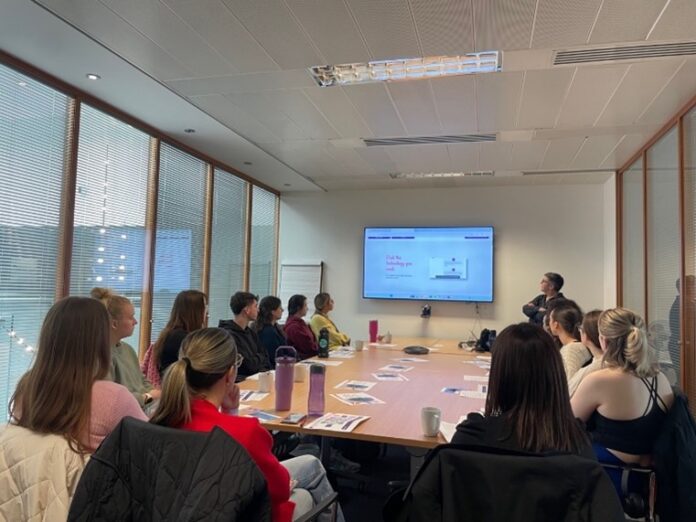at Napier University to Alzheimer Scotland
During my occupational therapy placement, we had the privilege of hosting a new initiative of a community visit from a group of first year Occupational Therapy and Physiotherapy students from Edinburgh Napier University at Alzheimer Scotland. The visit was a fantastic opportunity to showcase the valuable work done by the organisation, with a special focus on how the lived experiences of people living with dementia and their carers shape the care they receive. Throughout the visit, students learned about the role of technology in supporting independence and the vital role of post-diagnostic support for those living with dementia. It was a day filled with insightful presentations, engaging discussions, and valuable hands-on experiences, leaving both the students and staff with much to reflect on.
The day began with a presentation by myself, alongside Hannah, another Occupational Therapy student from Queen Margaret University, where we explored the importance of lived experiences for individuals living with dementia and their carers. We discussed how understanding a person’s unique experiences can not only transform care but also influence policies and practices. Drawing from our work with the Scottish Dementia Working Group (SDWG) and the National Dementia Carers Action Network (NDCAN), we highlighted the significant impact these groups have had in shaping dementia care, raising awareness and challenging stigma. By sharing their own lived experiences, individuals in SDWG and NDCAN provide invaluable insights that directly contribute to better support and services for those affected by dementia.
Their voices are key in ensuring that care approaches are person-centred, rights based, practical, and inclusive, influencing both local and national policy changes.
Next, Kathy Willis, Digital Advisor at Alzheimer Scotland, provided an insightful presentation on the role of technology in the lives of people living with dementia. She explored various pieces of assistive technology such as GPS trackers, smart home assistants like Alexa, and reminder systems, and demonstrated how these tools are transforming the way people live with dementia. These technologies allow individuals to maintain a level of independence that might otherwise be difficult or impossible, while also providing essential support to families and carers. Kathy’s presentation was not only informative but also practical, as the students had the chance to try some of these technologies first-hand. You can find out more here.
The day concluded with a presentation from two Alzheimer Scotland post-diagnostic link workers, Bernadette Mordaszewska and Catriona Chapman. They gave an overview of their roles and the impact they have on individuals and families post-diagnosis. The link workers also shared the 5 Pillar Model, which is a structured person centred approach used to guide their work with people living with dementia. This model highlights the importance of personalising care, supporting individuals in maintaining their independence, and providing emotional and practical support to carers. The students learned about the unique nature of post-diagnostic support in Scotland, particularly how services are integrated across the country and tailored to meet the specific needs of each person. The presenters also discussed the crucial role of signposting to other services and the positive difference this work makes in the lives of those affected by dementia.
Following the presentations, the occupational therapy and physiotherapy students were invited to reflect on the key messages they had taken away from their community visit. Some of the feedback included:
“Always remember to look at a person as a person and not their diagnosis.”
“Dementia can vary between individuals, and one plan does not fit all. Technology can also be very useful in helping people living with dementia remain independent.” “I learned about all the many services available for people living with dementia and their carers.”
The students’ feedback clearly reflected the impact of the community visit and the importance of recognising the diversity of experiences and needs when working with people living with dementia.
We also invited feedback from the staff member who joined the students
“Visiting Alzheimer Scotland offered our students a rich and meaningful learning experience. The opportunity to hear directly from staff supporting individuals post-diagnosis, and to explore the role of assistive technology hands-on, was both informative and engaging. Additionally, hearing from students currently on placement created a valuable connection and further highlighted the depth of opportunities and impactful work undertaken within the organisation, particularly with the Scottish Dementia Working Group and National Dementia Carers Action Network.”
Ashleigh Gray, Practice Education Lead. Edinburgh Napier University
Overall, the visit was an excellent opportunity for both occupational therapy and physiotherapy students to learn more about dementia care and the innovative ways in which it is being improved. The importance of lived experience, post-diagnostic support, and technology in supporting independence was at the forefront of discussion.
We would like to thank the Occupational Therapy and Physiotherapy students from Edinburgh Napier University for taking the time to visit and engage in these conversations. We hope the day helped expand their knowledge and provided inspiration as they continue their studies and future work as Allied Health Professionals.
Contributor : Emma Wall, Occupational Therapy Student at Queen Margaret University



